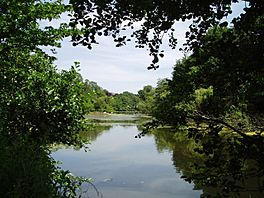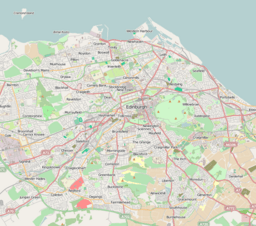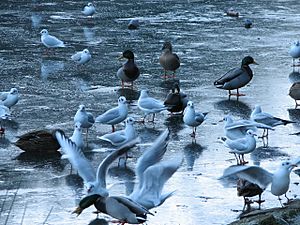Blackford Pond facts for kids
Quick facts for kids Blackford Pond |
|
|---|---|

View of the pond
|
|
| Location | Edinburgh |
| Coordinates | 55°55′31″N 3°11′45″W / 55.92528°N 3.19583°W |
| Type | Freshwater pond |
| Primary inflows | None |
| Primary outflows | Overflow drain |
| Catchment area | Blackford Hill |
| Basin countries | Scotland |
| Max. length | 225 metres (738 ft) |
| Max. width | 60 metres (200 ft) |
Blackford Pond is a small, man-made pond located in the Blackford area of Edinburgh, Scotland. It was created a long time ago, during the Victorian Era (between 1800 and 1900). The pond sits in a natural dip in the land, which was carved out by ice during the Ice Age.
Contents
Wildlife at Blackford Pond
Blackford Pond is home to many different birds. You can often spot beautiful swans and playful ducks swimming here. There's even a special bird house on the small island in the middle of the pond. This house helps attract birds throughout the year, making it a great spot for birdwatching!
In the past, the University of Edinburgh used the pond to teach students about counting fish. They used a method called "mark and recapture." This involves catching fish, marking them, releasing them, and then catching more fish later to estimate the total number.
About the Pond's Geography
This pond was created during the Victorian era in a natural hollow. This hollow was formed by glaciers, which are like giant rivers of ice, carving out the land. Maps from the Ordnance Survey show that the pond was built sometime between 1800 and 1900.
The pond is about 225 meters long and 60 meters wide. It has a small island in the middle. This island was originally much larger, but it got smaller over time due to erosion. Luckily, it was repaired and made bigger again in 2010.
Water Quality and Flow
The water in Blackford Pond is considered "eutrophic." This means it has a lot of nutrients. These nutrients come from things like water running off from nearby gardens (called allotments), leftover bread given to birds, and bird droppings.
Too many nutrients can cause "algal blooms." This is when tiny green plants called algae grow very quickly. These blooms can use up a lot of the oxygen in the water, which can be bad for fish and other creatures living there.
The pond doesn't have any rivers or streams flowing into it that you can see. However, there is a drain at one end. This drain helps to keep the water level steady, so the pond doesn't overflow or get too low.
In 2010, some important work was done on the pond. About £13,000 was spent to fix the edges of the pond, which had been damaged.
Visiting Blackford Pond
Blackford Pond is a very popular place for families to visit. It's easy to get to, and there's even a play area nearby for kids. The pond is right next to Blackford Hill, so you can easily access it from different directions.
Curling on the Pond
Long ago, the Waverley Curling Club used the pond for playing curling. This club started in 1848. Old photographs show people curling on the pond well into the 1900s.
Even today, the pond often freezes over in winter. It gets thick enough for birds to walk on the ice. However, it usually doesn't freeze solid enough to be safe for people to walk or play on. So, it's best to enjoy the pond from the shore!



